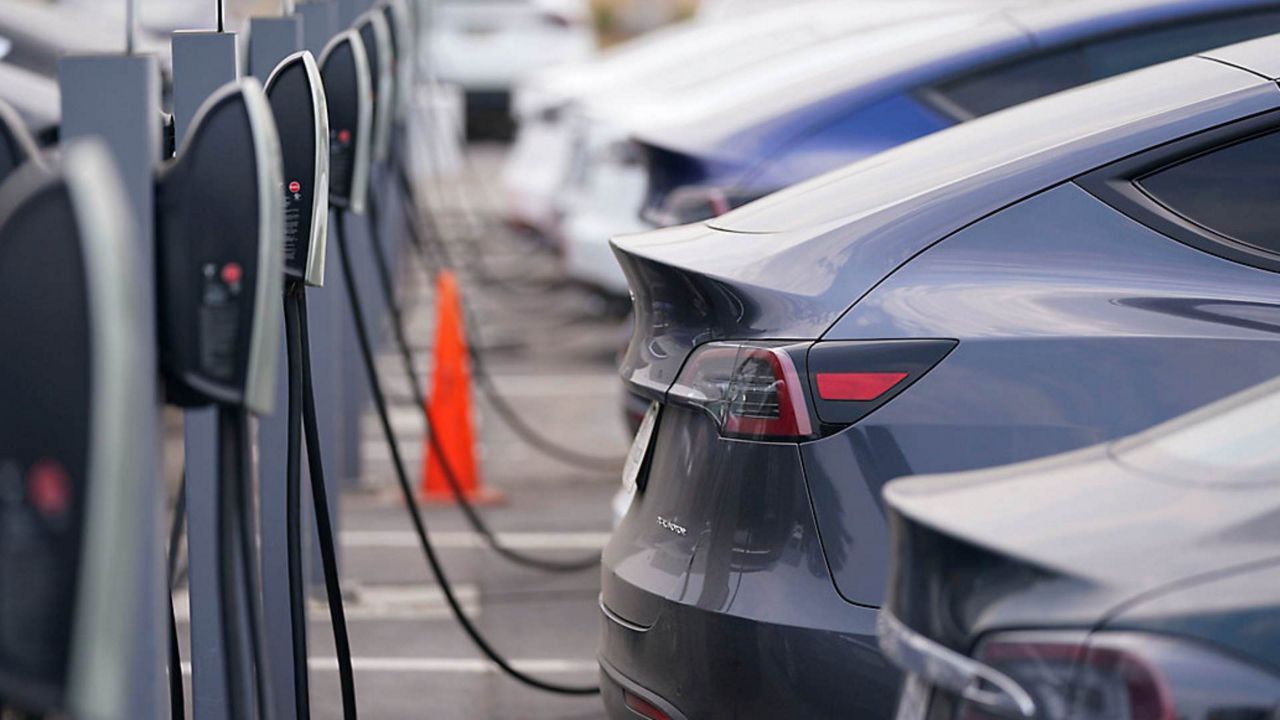The Biden administration is taking new actions to make electric vehicles more affordable and reliable.
The White House announced Friday it will expand tax credits to install EV chargers in low-income and non-urban communities and invest millions of dollars to research and develop EV materials and innovations on U.S. soil.
“We know that one big factor holding Americans back from purchasing an EV is the availability of fast, convenient charging,” Senior Advisor to the President for Clean Energy Innovation and Implementation John Podesta said Thursday during a briefing on the announcement.
To help President Biden reach his goal of creating a network of 500,000 EV chargers, the Treasury Department and U.S. Department of Energy are extending the eligibility of a tax credit that provides as much as 30% off the cost of an EV charger to individuals and businesses in low-income and rural areas. Private companies, including Wal-Mart, Pilot, Hilton, Marriott and others, will have access to the tax credit created through the Inflation Reduction Act.
During his first year in office, President Biden set a goal of all new vehicle sales in the U.S. being electric by the end of the decade. EVs accounted for almost 7% of new car sales in 2023, according to Cox Automotive — a percentage that’s expected to grow to 10% this year and 15% in 2025.
But there are headwinds. A 2023 Gallup poll found that 41% of Americans say they will not buy an electric vehicle. Cost, range and the lack of charging infrastructure are the top reasons.
While the average transaction price of an EV is reaching price parity with comparable gas-powered vehicles, and the Internal Revenue Service has now made it possible for EV buyers to claim the $7,500 federal tax credit at a dealership, instead of through their tax returns, fewer cars qualify for the credit following the adoption of new sourcing and manufacturing requirements.
“At the Department of Energy, we recognize that the EV revolution is happening, that car companies want to make them, that consumers want to buy them,” U.S. Energy Secretary Jennifer Granholm said on a call Thursday previewing the announcement. “The only questions remaining are really whether American workers are going to be the ones building them and whether working class Americans are going to be the ones driving them.”
On Friday, the DOE announced it is investing $131 million in research and development to help ensure EVs are made in the U.S. The funding will help researchers find ways to increase EV range, lower battery costs and develop more innovative charging systems, including bidirectional systems that allow EVs to not only pull electricity from the grid but give it back during times of peak energy demand.
To help unlock China’s grip on the EV battery material supply chain, the DOE will also invest in developing a U.S. supply of critical minerals used in EV production.
Through the Bipartisan Infrastructure Law, the DOE and Department of Transportation will award $46.5 million to fund 30 EV charging projects in rural, urban and tribal areas.
“Some of these are make charging accessible to underserved communities and to families who live in multifamily housing,” Granholm said. “Other projects are helping researchers develop EV charging solutions for extreme heat and frigid cold.”
The DOE and DOT R&D funding announcement comes as dangerous cold weather has paralyzed large parts of the country, including many EV drivers who have lost as much as 30% of their cars’ range because of extreme cold.
The joint funding will also support pre-apprenticeships in the electrical trades to train workers in how to service public EV chargers, some of which are nonoperational. A 2023 survey from the electric vehicle advocacy group Plug in America found that broken or nonfunctional chargers were a major difficulty or deal breaker for 14% of EV drivers, while a J.D. Power survey from August found customer satisfaction with public chargers had dropped to its lowest level since the research firm began its annual EV Experiencing Public Charging Study in 2021.
The Departments of Transportation and Energy are investing $150 million to help repair and replace existing, non-operational chargers and to ensure that future charger installations meet minimum standards for reliability.



